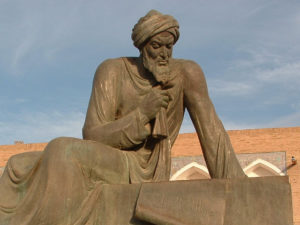
Abu Ja’far Muhammad ibn Musa al-Khwarizmi (780 – 850) was one of the most influential medieval Arab mathematicians. He made two remarkable contributions to mathematics – introducing our modern number system into western Europe, the Hindu-Arabic numeral system, and was a pioneer of early algebra.
Al-Khwarizmi lived in Persia and worked in the House of Wisdom under the caliphate of Al-Ma’num. The House of Wisdom was a public academy, research institution, and intellectual center in Baghdad that acquired and translated scientific, mathematical, and philosophical treatises, particularly those of ancient Greece. They also published original work, two of which Al-Khwarizmi is most famous for.
Around 820 Al-Khwarizmi published On the Calculation with Hindu Numerals. Al-Khwarizmi quickly realized the ease of use and efficiency of this decimal numeral system and the popularity of his book is largely responsible for spreading Hindu-Arabic numeral system throughout Europe. It was Latinized Algoritmi de numero Indorum, and Al-Khwarizmi came to be know in Latin as Algoritmi. From his name we derived the term algorithm.
About a decade later Al-Khwarizmi published his other famous treatise, The Compendious Book on Calculation by Completion and Balancing. In it he published the first know linear and quadratic equations. In doing so he revealed the techniques of algebra to the mathematical world. The term algebra is derived from al-jabr, one of the operations he used to solve his quadratic equation.
Al-Khwarizmi’s work and impact wasn’t immediately felt in Europe as it took until around the 12th century for his work to be translated and spread into Europe. His original manuscripts have been lost, probably when The House of Wisdom was destroyed during the siege of Baghdad in 1258. Only his Latin translations survive. However his popularization of our modern numerical system, his pioneering work in mathematics and early algebra, as well as his other lesser know works in astronomy cement his legacy as one of the most influential scientists of the medieval era.